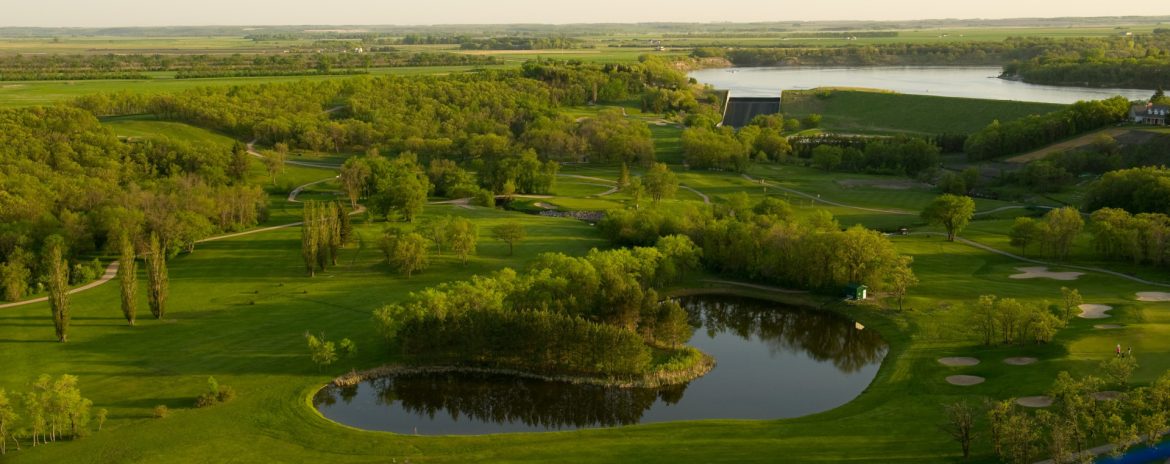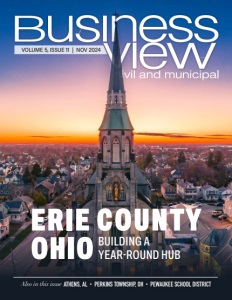Morden, Manitoba
Ancient fossils and future growth
A vibrant economy and great quality of life
The City of Morden, Manitoba, population around 10,000, is located just on the edge of the Pembina Escarpment, about 11 miles north of the U.S. border and 75 miles southwest of the capital city of Winnipeg. The mile long, 4 lane highway entrance into the community is lined on both sides with majestic Elms that take your breath away with their stately beauty. The land, which is the ancestral home of many indigenous peoples, including the Anishinaabe, Cree, Oji-Cree, Dakotas, and Red River Métis, became a municipality in 1882, when the Canadian Pacific Railway built a line crossing Dead Horse Creek. Named after Alvey Morden, on whose family’s land the community was established, it became a town in 1903 and a city in 2012.
Modern Morden
Today, Morden is a thriving small metropolis with a diverse economy based on agriculture, manufacturing, and government services, including both provincial and federal offices. It is perhaps best known, though, as the home of the Canadian Fossil Discovery Centre, which was founded in 1971. The Centre houses Canada’s largest collection of marine reptile fossils, left behind when the glacial Lake Agassiz’s waters fully drained, and uncovered during the mining of its reserves of bentonite, a highly absorbent, viscous, plastic clay used in a variety of industries and applications as a binding, sealing, absorbing, and lubricating agent.
Chief among the collection, which is located in the Access Events Center, an all-season recreation facility that serves as Morden’s social, sports, educational, and community hub, is Bruce, the largest (43-foot long), publicly exhibited mosasaur in the world, who lived some 80 million years ago. The Fossil Discovery Centre offers school programs, guided tours, summer day camps, paleo tours, and fossil dig programs. It also hosts scientists and researchers from the province and beyond in the fields of paleontology, cartography, and geology.
Morden is also known for its Corn and Apple Festival, a three-day event begun in 1967 that celebrates two of its local agricultural products that thrive in the area’s long growing season. The festival, which takes place in Morden’s quaint and historic downtown, attracts up to 80,000 visitors to the city every year.
Other notable attractions in Morden include the Morden Research and Development Centre, one of Agriculture and Agri-Food Canada’s network of 20 national research and development centres; the Minnewasta Golf & Country Club, located on the edge of the beautiful Lake Minnewasta with its sandy beach, hiking trails and boat launch; the Manitoba Baseball Hall of Fame in the Access Events Center; the Kenmore Theatre, home to film, dance, and live theater performances; and several community parks and green spaces, all linked together under a verdant tree canopy that shades the Dead Horse Creek as it courses through the town.

The Morden business community
The Stephen Street Retail District in downtown Morden is populated mostly by boutique businesses, and over the past few years, the city has provided various incentive programs for its property owners, such as a façade program to enhance the area’s curb appeal, and a tax incentive program to help renovate owner-occupied commercial buildings.
The Pembina Connection at the city’s east entrance is Morden’s newest commercial corridor, with several retail outlets already open for business and additional shovel-ready lots ready for development. In the southeastern part of the city lies the Morden Industrial Park, which is home to a number of manufacturing businesses, including Solventum, formerly 3M Health Care, Buhler Manufacturing (farm equipment), the Huron Window Corporation, the Décor Cabinet Company, Cross Country Manufacturing (truck trailers), Elias Woodwork & Manufacturing, and Drive Products (truck parts and accessories).
In fact, the Industrial Park has been so successful that it has almost filled up its available lots. “Our industrial sector has been growing so fast over the last few years, that we ran out of vacant lots in our Industrial Park – over 30 acres of land sold in 3 years,” reports Jason Dyck, Morden’s Economic Development Officer.
“So, we had to make a big decision as a city as to whether or not to invest in an expansion of the park. A year-and-a-half ago, council voted to acquire 142 acres of new industrial parkland, and we’re working to bring that to market within the next six months or so. That’s a really exciting opportunity to grow the employment sector in Morden with a focus on manufacturing. And we will be applying our property tax incentive to the new industrial businesses that want to get set up there.”
Supplying industry with workers
There are a few good reasons why new businesses would be eager to set up shop in Morden. One is Manitoba’s Provincial Nominee Program’s (MPNP) Business Investor Stream (BIS), an immigration program that allows foreign entrepreneurs to immigrate to Manitoba to start or purchase a business; and another is Morden’s Community Driven Immigration Initiative’s (MCDII) Skilled Worker Program, which works with local employers to identify targeted occupations, and then pairs them with qualified immigrants who apply yearly in the thousands for those skilled worker positions and permanent resident status.
The city also works to educate, produce, and promote its own native supply of employees. “Workforce development has been a big focus of the city for the last ten years,” Dyck notes.
“We’ve grown different types of programs to support access to employment and training opportunities within the community. In particular, the Red River Technical Vocational Area (a partnership of five southern Manitoba school divisions devoted to providing apprenticable trades training options to high school students in the region) has done some fantastic work setting up a regional training center for welders and pipefitters. For the last year-and-a-half in high school, students are able to earn credits towards their apprenticeship levels in both trades.”
“Also, our students get to be part of a broader regional training effort where they can take a number of other apprenticable trades in other communities,” Dyck continues.
“We bus kids in to do welding and pipefitting in Morden, and then we bus kids out to other communities that are in partnership with this technical vocational area to do automotive training, carpentry, electrical trades, healthcare, and a number of other training opportunities. That’s a really robust program integrated with our high schools and we’re trying to expand that to include access to IT certification, as well, because our needs for computer skills and IT infrastructure are growing daily.”
“As our companies are growing, they’re finding that they’re really constrained by access to talent in the IT sector. So, we’re working with some colleges to bring a certification program to town to complement that need and pair it up with job placements, as well. We’re also working on a new program, supported by the federal government, to support production worker training in town with essential shop floor skills such as forklift operation, first aid, and WHIMIS certification to name a few. So, we’re really excited about that. That program will come online early 2025.”

The housing challenge
Meanwhile, Morden has to overcome one particularly thorny challenge as it aims to grow the workforce population with which to supply its growing industrial base: it has a shortage of affordable housing units and is restricted from building many more.
“The province has limited residential development in the city,” explains Mayor Nancy Penner, “because we are at our maximum now in our wastewater system, which means we’re approving new developments, but we’re restricted on how many homes developers can build in the next two years. So, right now, we are desperately searching for land to relocate our city lagoon. We’re getting close, but funding is the next hurdle we have to meet and we’re probably about $30 million short.”
“We’ll be lobbying both the provincial and federal governments, while also looking at alternative sources of funding, because we don’t have enough borrowing capacity to meet the shortage. We have over 670 homes ready to build, but until we get our wastewater situation addressed, we can’t reach the full market demand for new homes.”
Some good news on the housing front has managed to break through, nonetheless. “In the last few years, the city has worked with the province to bring on eight new affordable housing units,” Dyck reports.
“It’s part of a twelve-plex that is now open and fully occupied. Habitat for Humanity also recently completed its first duplex in partnership with the City. And we just ran a homebuyer’s assistance program, working with Manitoba Housing, to help seven first-time home buyers get a down payment for their first home. While it’s been a challenging time, we feel that the city has done some great work within these constraints to support access where we can.”
Better times ahead
Another few pieces of good news: Penner shares that Morden is in the planning stages of building a new 40-acre soccer field and community garden in the northwest area of town, linking its community pathways that cut through various residential developments (“We’re big on walking,” she states), and opening a new K-8 elementary/middle school with a million-plus-dollar rubberized track that will attract future track and field events.
Also looking ahead, Dyck hopes to see the city’s development projects come alive — especially the new industrial park expansion. “Access to competitively priced, shovel-ready land is essential for businesses to meet their growth potential ,” he reveals, “and we find ourselves perfectly situated to help companies find alternative spaces with a higher quality of life than larger urban places.” He also hopes to continue matching new immigrants to the jobs that employers are trying to fill. “We have a lot of competitive advantages to capitalize on the industrial growth that our region has seen recently.”
City Manager Nicole Reidle also prefers to see the positive signs in Morden’s future. “I see having the wastewater problem solved by building our new wastewater facility and providing the permits that the developers want, to build the new houses and commercial structures,” she opines. “We’re going to see a huge growth in our city. We will have challenges, but I’m confident. We’re a beautiful city, a great community to live in, and I’m excited to see where we go over the next couple of years.”
Mayor Penner agrees. “We are one of the most beautiful cities in southern Manitoba,” she declares. “We’ve maintained our heritage, but we’ve incorporated the new. We have the bones, the elevation, the tree canopy, the history, the stone buildings. So, once we get our infrastructure figured out, look out. We’ll be an entity to be reckoned with.”
AT A GLANCE
Morden, Manitoba
WHAT: A city of around 10,000
WHERE: A few miles north of the U.S. border in the southern part of the province
WEBSITE: www.mymorden.ca
PREFERRED VENDORS
MWM Environmental – MWMEnviro.ca
MWM Environmental provides innovative waste management solutions with a commitment to sustainability and efficiency. We equip our teams with the best technologies to deliver outstanding service and environmental solutions. Our focus is on creating a greener, more sustainable future for the communities we serve, making us a trusted provider in our markets.




